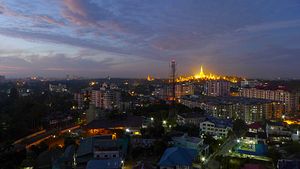The arrival of Aung San Suu Kyi’s civilian-led government to Myanmar in 2016, after decades of military rule, has quickly turned out to be a false dawn for hopeful international investors. It was supposed to create an opening for eager businesses to tap into the nation’s enviable position between the economic engines of China and India — but it hasn’t turned out that way.
Since reeling in $9.5 billion in foreign direct investment (FDI) in the 2015-16 fiscal year, annual inflows have decelerated. (The projected take for this year is expected to be $5.8 billion.) Slow progress in opening up the country’s private sector, and ongoing challenges with weak infrastructure, have been partly to blame. But the ethical and reputational difficulties of doing business in a country where the military have been accused by the United Nations of “ethnic cleansing,” through its widely documented persecution of the Rohingya community, has arguably underscored investor reticence. The potential for retributive sanctions from the European Union (EU) and United States, which would harm the economy, has also added uncertainty.
The government is on alert. A flurry of recent roadshows showcasing the country’s $70 billion economy has attempted to rebuild the country’s image. Meanwhile the Myanmar Investment Commission launched an ambitious plan to draw $200 billion to the country in the next two decades. Aung San Suu Kyi also made a controversial plea to lift business activity in Rakhine state, where the atrocities against the Rohingya have been committed.
Understandably, this has created a lot of consternation from human rights activists who feel the courting of foreign cash may whitewash the treatment of Myanmar’s ethnic minorities, or risk bankrolling further military-led abuses. But, it has also erupted into wider calls for tourists, companies, and the international community to avoid, or even boycott, the country. This added frenzy has only served to muddy the water for even responsible Western investors, who seek to shield themselves from any potential PR downfall by association.
The lost income from fearful investors is likely to hurt Myanmar. The country will miss out on the jobs and access to products, financial services, and technology that drive living standards and underpin economic growth. It also risks pushing Myanmar further outside the influence of the international community. Indeed, Chinese investors, often backed by the state, appear more willing to partner with military business ventures and turn a blind to the country’s human rights situation. In the 2017-18 fiscal year, investments from China amounted to around $1 billion more in the country than investments from the United States, U.K., and Germany combined.
Perhaps more consequential for the country’s long-term development is that the lack of FDI in new private sector activities only serves to further entrench the influence of the army’s existing shadowy business interests. Through the holding companies Myanmar Economic Holdings Limited (MEHL) and Myanmar Economic Corporation (MEC), the military, also known as the Tatmadaw, is able to siphon off revenues from the lucrative natural resource sectors and build stakes in economic activity throughout the country, including in transport, banking, cigarettes, and beer markets. So with competition in the private sector stunted, civilian expenditure inadvertently further lines the pockets of the military, thereby sustaining their political and economic stranglehold on the country.
Creating the space for responsible investment in Myanmar is therefore crucial for its future development. Yanghee Lee, special rapporteur on the situation of human rights in the country, in a recent report emphasized the importance of ensuring investments and private ventures do not support military commercial interests, including potentially extending sanctions on MEC and MEHL. That might prove a useful signpost for investors to avoid business with the Tatmadaw. But like the EU’s threat to remove preferential trade for the country, it could end up harming those it seeks to serve. Both military entities are so entrenched in the economy, sanctions may have a knock-on effect, by raising prices or leading to job losses for regular citizens — so any punitive measures would need to be particularly carefully targeted.
But Aung San Suu Kyi’s government has a key role to play too. The corporate environment remains considerably weak, and even with a move toward peace in Rakhine, investors will remain hesitant. Reducing the hurdles to starting a business, securing reliable electricity, and improving legal protections for investors will all be essential if a flourishing private sector is to take root, draw further FDI, and dilute the military’s economy. Investors will also be looking for distinct guidance from the wider international community and nongovernmental organizations on how exactly to be a responsible operator in the country.
Businesses will also have an important part. When Japanese beer brand Kirin’s ties to the Tatmadaw were uncovered, Amnesty International reiterated the need for companies “to be transparent in the steps they take to avoid causing human rights issues.” Indeed, setting out clearly how investors seek to approach the country responsibly is also vital in offsetting reputational damage with the spotlight on the country. They can also take a leading role. Chevron, an oil producer, recently agreed to help develop practices for companies operating in similar environments, following a resolution by an activist investor in the firm calling on it to put more focus on humanitarian issues around its operations in the country.
Stemming the outflow of FDI is not going to be easy, and if responsible investors continue to be scared away from the country, only the military will benefit. And so, Myanmar’s citizens and human right activists alike will be hoping that cooler heads prevail.
Tej Parikh is a global policy analyst and journalist. He tweets @tejparikh90 and his work is archived at The Global Prism.

































